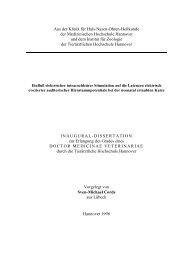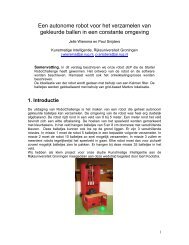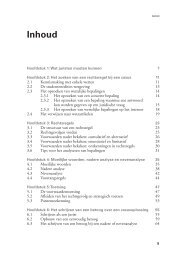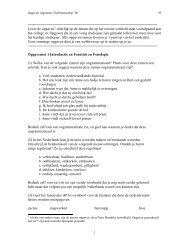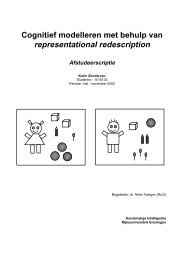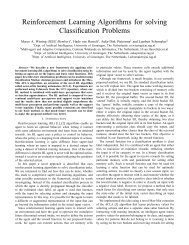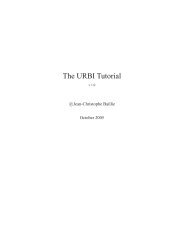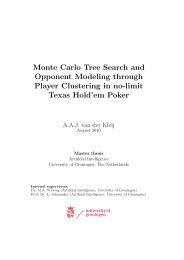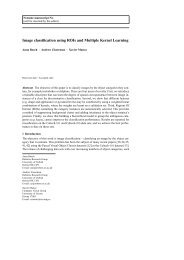Presuppositions in Spoken Discourse
Presuppositions in Spoken Discourse
Presuppositions in Spoken Discourse
Create successful ePaper yourself
Turn your PDF publications into a flip-book with our unique Google optimized e-Paper software.
Chapter 5<br />
<strong>in</strong>dividual. But this perhaps should be analyzed as b<strong>in</strong>d<strong>in</strong>g to someth<strong>in</strong>g <strong>in</strong> the<br />
discourse situation. It is unclear how non-l<strong>in</strong>guistic antecedents and b<strong>in</strong>d<strong>in</strong>g to<br />
them should be handled <strong>in</strong> the discourse analysis, but it is clear that this example<br />
cannot be considered a case of pure accommodation. The question is, if and when<br />
too can accommodate without any antecedent at all.<br />
Most of the examples <strong>in</strong> the literature where it is attempted to show that too<br />
and the other similar triggers are actually able to accommodate are examples that<br />
are “out of the blue” or given without a context. The reason for this is that the<br />
need to b<strong>in</strong>d is so strong, that if too is added to a sentence <strong>in</strong> a context, it leads to<br />
the immediate identification of several rhetorical relationships that were not<br />
perceived earlier. This can be illustrated with the follow<strong>in</strong>g example, where Speaker<br />
A is describ<strong>in</strong>g the war experiences of an acqua<strong>in</strong>tance to Speaker B, and I have<br />
added a number of too’s which were not <strong>in</strong> the orig<strong>in</strong>al text.<br />
(35) (1-10 198)<br />
Speaker A He was <strong>in</strong>valided out of New Gu<strong>in</strong>ea with three k<strong>in</strong>ds of jaundice (too)<br />
two k<strong>in</strong>ds of malaria (too), extensive jungle sores (too). Filthy climate,<br />
dengue fever (too) and a couple of other th<strong>in</strong>gs to be go<strong>in</strong>g along with<br />
and he was <strong>in</strong> hospital for six months (too) hover<strong>in</strong>g about<br />
the *place* till he made his m<strong>in</strong>d up to come back, you know.<br />
Speaker b Frightful.<br />
Speaker A He weighed six and a half stone when he came out of New Gu<strong>in</strong>ea.<br />
He‘s about the same height as me (too), which is not good and you<br />
know you you can duplicate this (too) among . a {lot of middle-aged}<br />
Australians (too)<br />
Speaker b Yes - - it makes for a great great generation gap (too) <strong>in</strong> this country<br />
(too) at any rate.<br />
Speaker A Well, the generation gap is the same anywhere I th<strong>in</strong>k between anyone<br />
who took part <strong>in</strong> World War Two and people who’ve grown up liv<strong>in</strong>g on<br />
the fat of the land without any prospect of be<strong>in</strong>g conscripted (too)<br />
The example above <strong>in</strong>tends only to show that, given a context, too will f<strong>in</strong>d an<br />
antecedent, mean<strong>in</strong>g that its presupposition is underspecified enough to easily f<strong>in</strong>d<br />
someth<strong>in</strong>g to b<strong>in</strong>d with <strong>in</strong> a rich context.<br />
The too’s <strong>in</strong> example (35) can obviously be removed. However, <strong>in</strong> Zeevat (to<br />
appear), Zeevat mentions that he has exam<strong>in</strong>ed a Dutch novel together with a<br />
student and attempted to remove the Dutch equivalent of too, and that <strong>in</strong> most<br />
cases the version without the too was an <strong>in</strong>felicitous alternative. 13 Example (35) is<br />
the opposite of what Zeevat (to appear) did <strong>in</strong> his study where he removed too’s.<br />
Where does the difference come from? The best explanation I have for this is that<br />
13 We can guess that the examples all were cases of too with antecedents, though Zeevat doesn’t<br />
explicitly mention if the too’s were bound or accommodated. If they were cases of accommodated<br />
too’s then the <strong>in</strong>felicity experience by the versions without the too would have to be considered<br />
evidence that the version without the particle cannot be considered as real non-presuppos<strong>in</strong>g<br />
alternatives.<br />
130



